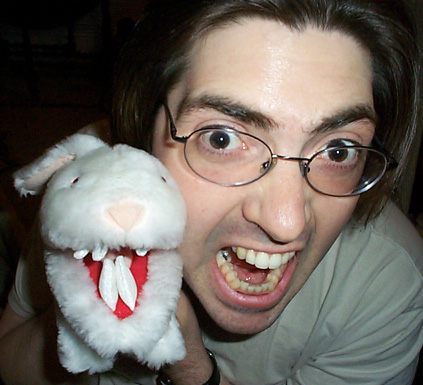When what I thought what was a pleasant enough, solid-three-star movie '
Once
' suddenly turns up on all sorts of Critic's Best of 2007 lists, I feel a tiny bit of dread - the dread of seeing something get undo attention and praise. I suppose this is the same sense of dread most critics feel when films like '
Ernest Saves Christmas
' debut at number one at the box office or when
Rob Schneider
films make any money at all.
When a dimly-lit, camcorder-ugly film get placed on a pedestal over visual masterworks like '
No Country for Old Men
', '
Ratatouille
', or '
Atonement
' I feel like wringing my hands and saying, "What is wrong with film critics today? Why do they overpraise a merely good movie, instead insisting that it is a super duper pile of greatness and that perhaps it redefines the very definition of a movie musical?" (Side note – someone really wrote that ‘
Once
’ redefined the movie musical, as if after seeing the film, the makers of '
High School Musical 3
' suddenly ceased production, scrapping all of their prior work and hastily resetting the production in dark rooms filled with drunken, crooning Irishmen and filmed the whole thing with a shaky, cheap, hand-held camcorder.)
Some perspective is needed. Because last year's '
Hustle and Flow
' does everything '
Once
' does and manages to look amazing. So does this year's '
Heima
'. And let's not forget
Glen Hansard's first film, '
The Commitments
' which is superior to '
Once
' on every conceivable level.
The main difference is that those films do not have an aspect to them that '
Once
' does. That aspect is a little something I call emo-porn.
Emo-porn involves a freak-show display of emotion that some people would call "real" or "raw." It usually involves overly sensitive people screaming (the "emo" part) and it involves people not acting and really doing what you see on film
for reals (the "porn" part).
The key to understanding the "emo" portion of '
Once
' comes from the music it features. The other films feature different types of music, from rap to art rock to soul. But '
Once
' focuses on a guy with a guitar. A
sensitive guy with a guitar who's idea of wooing a woman is to get her into his bedroom for a music rehearsal and then beg her into bed with his little sad, pathetic puppydog eyes. All he needs is some dark bangs brushed into his eyes to be the perfect poster emo boy.
Everyone with pretensions to being a sensitive guy with a guitar, every film critic with a secret desire for the whiny guy to quietly mew mew mew his way to triumph, every over-emotive over-exaggerating, over-praising person on the planet can't help but glom onto this film, waxing eloquently about about how it moved them like no other film, and how it drove them to write bad high school poetry for the first time since... well, since high school.
And what exactly makes the mind go to high school poetry?
Check out these lyrics from one of the songs:
When your mind's made up.
When your mind's made up.
When your mind's made up.
When your mind's made up.
Ah.
When your mind's made up.
When your mind's made up.
When your mind's made up.
When your mind's made up.
Ah.
When the lyrical complexity of a song is about one-tenth that of '
Oh, Susannah
', a musician would normally give up and start over. But this song works because each line is sung with a different level of emotion. Sometimes, "when your mind's made up" is whispered, sometimes "when your mind's made up" is screamed.
Surprisingly enough, this actually works as a song, but it doesn't really work as a piece of film. Because film is essentially a visual medium, and because the filmmakers decided somewhere during the planning stages that the songs were the best part and that they shouldn't focus on any of the visual aspects of production (like, oh, lighting and focusing), it fails. As a soundtrack it succeeds, but as a movie, it comes up a little bit lacking.
What it does have, though, is the "porn" part of the "emo-porn." Because during the filmmaking the two principle cast members fell in love, so what you are really watching is not really a movie, but instead two people fall in love
for reals. No longer can you say that the acting performances are off, because the people aren’t really acting. In a strange marketing twist I like to call "The Ewok Effect" everyone seems to know these two people fell in love even though it is not pertinent the movie itself, just like everyone knows the word "Ewok" even though that word is never mentioned in any Star Wars movie.
So in effect, by saying '
Once
' is a solid, three-star film, over-emotive people will think you are giving love itself three-stars, and you are a cold, cruel person with no discernable soul. When you point out that '
Once
' isn't as visually enticing as, say, ‘
Zodiac
’ you will be reminded that love is blind and you are a heartless person for suggesting that something so fragile as new love needs a camera crew who knows the best way to film in low-light conditions so everything doesn’t seem like an under-exposed, reddish brown blob.
Essentially, by taking the film out of the context of being a film, critical discourse without passing judgment over the people involved becomes impossible. And for people like me, people who like talking about films just as much or even more than watching them, it puts us in the uncomfortable and unpopular position of pointing out that the emperor has no clothes.
